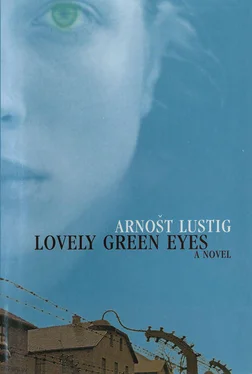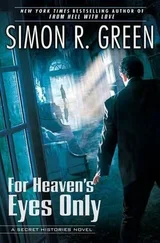She was thinking of what Beautiful had done. And how ridiculous it was that she had survived even Long-Legs.
The Obersturmführer explained how, from spring to autumn, he fished the Polish rivers. He no longer felt quite so much in a foreign country; he had come to feel at home. Eels did very well in rivers with dead bodies in them. They grew fat even from dead horses. As for bream, perch and carp — one of his friends called them the rats of the rivers — a hand grenade was more effective than any fishing line.
He told her about a transport of French Jewesses from Drancy near Paris. The French police had rounded them up, 2,000 of them had been under 15 years of age. A man in Bordeaux had given them false papers. She would not believe how many Jews there were in France, but their arrogance would encounter German thoroughness. Those girls had been too weak for work. Guided by searchlights they had gone into the darkness. The sheer force of the crowd had pushed them into the underground rooms. They had looked like a monstrously large flower of a water lily, with 2,000 blossoms, soon to be devoured by a carnivorous plant. They had stood for a day and night on the square before being sent to the gas chamber. They had arrived in the morning and their turn had not come until the evening of the following day. Some had fainted; some had wet themselves, or thrown up. Fortunately, the Jewish Moloch devoured itself.
He asked her to clean his uniform. And could she sew a button on the pocket in which he carried his emergency rations? He liked everything neat and tidy. He would wait in bed.
“The world is divided into Jews and non-Jews, into a pure and an impure race,” he said. “That is the only boundary human history acknowledges. That’s what future anthropologists, philosophers and astronomers will write about.”
The fire was going at last, the flue turning red-hot. She went to get a needle and thread, then sat down on the edge of the chair on which he had put his clothes. The Obersturmführer remained lying on the bed, whistling to himself.
She didn’t know that a Moloch was a Phoenician god personifying the creative and destructive force of the Sun, he thought. But at least she knew about the poets. Die Sonne bringt es an den Tag) Nothing new under the sun.
“Es kommt der Tag,” he said. The day will come. “One thing you should know, a thing the whole world should know. Even a defeated Germany will not fall upon its knees.”
She had learnt to sew on buttons while still at home — with a little shank so that buttoning up would be easier and to stop the button from tearing off. She caught sight of the lines on the Obersturmführer’s face and around his mouth. He shut his eyes. He was sleepy; the music worked like a lullaby. They were playing a Strauss waltz, one that started softly and went on for a long time. Violins, a zither and clarinets. An echo of warmth, domestic comfort and everyday worries. “Tales from the Vienna Woods”.
Once Skinny’s mother had danced with her father to it. She finished wiping clean his uniform. The button was sewn on. The waltz swayed on for ten minutes or more. The Obersturmführer was snoring. From her sock she retrieved the screw of newspaper. She did not have to hesitate now; none of them would be there for much longer. They would not leave the prostitutes behind without guards. She had to be careful and quick.
Skinny looked at the Obersturmführer’s closed eyes, his purple lids, his depraved features. She shook some of the powder into his schnapps flask and the rest into his pocket, taking care not to touch the cyanide, the Zyklon B. She pictured Obersturmführer Stefan Sarazin of the Einsatzkommando der Einsatzgruppen from Garmisch-Partenkirchen standing near the tavern by the wooden crucifix. She saw Beautiful, Ramon, her father. The waltz was coming to an end with a roll of drums. She imagined the Obersturmführer in the middle of a punitive action, taking some bread out ofhis pocket, some salami, and washing it down with schnapps for courage. Or in a camp, watching those young French girls.
She stoked the fire. The scrap of paper flared up, the letters on it burning first. She closed the stove door. The clash of cast iron against cast-iron woke the Obersturmführer.
“What’s the time?”
“I don’t know.”
“I can hear music, so it can’t be very late.”
“No.”
“Have you finished the job?”
“It’s been finished some time.”
“That was quick. Let me see.”
She handed him his tunic. He was satisfied.
“Why didn’t you wake me?”
“You didn’t tell me to.”
“You should guess what I want and what I don’t want.”
“Yes.”
“You’re working for Germany.”
He laced up his boots with their 38 nails in each sole. Casually he smoothed his greasy hair, and put on his cap to hide his scar. “We’re in a war of races,” he said. She watched him dressing.
“I’ll tell you one thing and you’d better remember it,” the Obersturmführer declared. “I didn’t know what beauty was till I came out here to the east. To find you’re allowed everything. That there’s nothing at all that you can’t do.”
“Beauty is beyond morality,” he went on. “Beyond good and evil. Beauty is Germany, the Waffen-SS, the Einsatzgruppen, the Jagdkommandos. The bomb that drops on an inhabited site. A town consumed by flames. Anything that dissolves into nothing. A captured enemy division turned into ashes like those vermin at Auschwitz-Birkenau, Treblinka and Majdanek. The hand grenade we thrust between the legs of that Jewish prostitute. I pulled the pin and watched from a distance as she lay there, with her hands tied, screaming, and then turned into a firework.”
He remembered the smell, the burnt flesh, the incinerated skin and bones, the hair flying in the wind like an old man’s beard.
“A pity those scribes weren’t present, the ones we burnt at the stake along with their books. Beautiful is whatever dissolves the ugly, the unnecessary, the subversive.”
She assumed that he expected no reply from her. It was one ofhis outbursts. He was intoxicated by it.
“You’re young. Beauty is not just a picture. Beauty overturns what we’ve become accustomed to. Nothing we’ve known before can withstand it.”
She kept silent.
“Beauty is death,” Obersturmführer Sarazin said. “My lover. The most faithful of all. If I didn’t know what death was I wouldn’t know what beauty is.”
She could not avoid his eyes. She felt as if she were sinking into dense fog, the end of which she couldn’t see. She was desperate not to arouse his suspicion.
Some of the girls were busy in their cubicles. The Oberführer had had to turn a blind eye. Skinny returned to the party. Estelle was missing. It was just after n p.m. and “The Emperor’s Waltz” went on and on. She didn’t even notice which of the guards she danced with.
“Let’s get back to our posts,” said Oberführer S chimmelpfennig finally.
During the night a truck from the Wehrkreis arrived with a barrel of salted herrings. Later that night the Oberführer was visited by a liaison officer from the head of the Gestapo, Heinrich Himmler. The officer was Himmler’s personal representative in the region. He brought The Frog his evacuation plans.
In the morning Skinny watched a guard stripping his rifle on a green blanket spread on the snow. He cleaned every single part, then oiled it and reassembled the weapon. He looked at it lovingly.
Major von Kalckreuth was with Madam Kulikowa in her room. He remarked that the high command in its bunker in Berlin was like the crew of the Titanic . The ship was down at the bows, but the band went on playing military marches.
“We’re waging a war of cannibals, my dear,” the major said.
Читать дальше


![Корнелл Вулрич - Eyes That Watch You [= The Case of the Talking Eyes]](/books/32103/kornell-vulrich-eyes-that-watch-you-the-case-of-thumb.webp)









